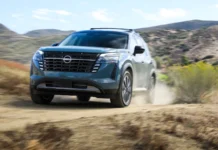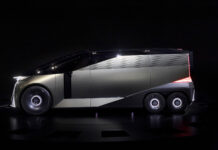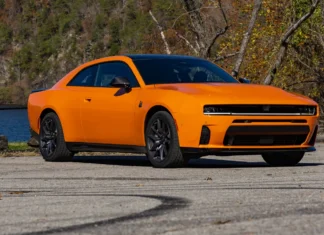
In this week’s Ask Nathan:
- Honda’s small pickup hybrid was in the works 25 years ago!
- Toyota RAV4 vs the 2025 Chevrolet Equinox?
- The USA has done the EV dirty.
The first question comes from a Honda fan who is commenting on a TFL podcast where I mention Honda’s PHEV small pickup concept – from the floor of their museum.

Q: (ViaTwittwr/X @NathanAdlen): Nathan, Honda’s hybrid small pickup was seriously in the works over 25 years ago!
That concept was called the Spocket (not “Sprocket”) and it could have turned the industry on its head.
– G. Gene
A: Yup, and I remember seeing this thing before – but only on screen. It’s cool in person.
You’ll have to fast-forward quite a bit to get to the section where I briefly cover the Spocket, mispronounce the name, and talk about it. In time, I want to get my hands on it for a full video. That’s because I fully agree with you: this car (or something like it) could have completely changed the small pickup game, before it became a thing.
The Spocket was designed in 1999, and it was equipped with a multipurpose tailgate that could extend into a ramp. Great for bikes or, as indicated in the concept sketch, a go-kart. In addition, when not hauling, part of the load area could flip up giving passengers a back seat. The driver and passenger doors swing up “switchblade” style, and the cockpit still looks futuristic, despite the age of the design.

There were no solid numbers available regarding the Spocket’s powertrain, other than it being a “hybrid.” In addition, we have no way of knowing what type of capacity the little pickup could have had. With that being said, there are a few things we can assume with what was available from Honda back then. Combined with the electric motor, the VTEC-E gas engine three-banger (the early 2000’s Honda Insight’s engine) made about 80 horsepower. That doesn’t take into account the rear electric motors, which are hinted at.
I’m assuming the designer was thinking about a vehicle that made more that 100 horsepower (combined) and could still achieve about 50 MPG. The go-kart, and gear can weigh between 200 – 300-lbs. It’s easy to assume that its overall payload hovered between 800 and 1,000 lbs. Finally, an adult go-kart can be over six feet long; however, that cart in the sketch looks more like a Jr (“kids”) Kart, which is much smaller. So, even at about five-feet (which is what it looked like to me), it would have been competitive with the new small pickups.
All of this is guessing.
I wish there was something like this on the road today. It should be said: a concept like this could be a rather interesting EV – no? In the end, the Honda Spocket was way ahead of its time, and (could-have-been) very utilitarian, and damn cool to look at too.
– N
The next question comes from a viewer who saw our first of two 2025 Chevrolet Equinox videos.

Q: (Via: YouTube) Give me one good reason why I would think about buying a 2025 Chevy Equinox over a Toyota RAV4!
I’m not trying to be a jerk but I think that it makes no sense to buy the Chevy over the Toyota. Does it?
– Craig90YY
A: I hear you, and I think it all comes down to aesthetics and pricing.
The eggheads at GM gave the design team a limited budget, and they did a bang-up job making lemonade out of lemons. You see, this vehicle was a fine example of the GM leadership simply kicking the can down the road, before some talented folks found a way to make it better than the previous model. While I can’t talk about driving impressions for another week, I can say that they were smart in how they stretched their bandwidth.
By making the exterior more memorable (especially the Activ trim) and stepping up the interior design, the designers made intelligent choices. I was genuinely surprised at the improvements, as the previous Equinox was one of my least favorite GM products. In this way, added with LOTS of standard goodies for the dollar, the little crossover remains relevant.

You’re right, the Toyota is an easier choice. I think the Chevy’s power and economy numbers lag behind the best in class, as do the powertrain choices. Still, the Equinox has its strong points, and it would be a shame to forget that.
I went online and specked out a 2024 Toyota RAV4 TRD, with just one cold weather package, to try and make the features comparison apples-to-apples. The total for the RAV4 came out to $41,205. The 2025 Chevrolet Equinox ACTIV AWD comes out to $36,395. Those prices are with destination charges.
I truly like the way the Equinox ACTIV looks, and I find that (for the money) it’s a hell of a value.
Stay tuned for a full video review of the new Equinox coming soon!
– N

The last question comes from a viewer who feels like we (all American automotive journalists) have sullied the potential of the EV.
Q: (Via: Twitter/X@NathanAdlen) Why is it that most American journalists cheer wherever the auto makes pull back the EV timeline?
As corrupt and horrible as the UAW is, they had a few good plans for converting over to EV production and making even more jobs because of it. It was all pie in the sky stuff and before they tanked other talks they told their workers not to worry about the conversion. Now the winds have changed and the EV mandates are being pushed back everywhere. People are losing their jobs and the UAW is too busy being vocal about Mideastern politics instead of helping their workers.
Journalists love to do the whole ‘I told you so‘ thing as if they made the consumers and auto makers change their minds. Why is it such a good thing to pull back from EVs? I know that some right wing journalists are against anything that threatens big oil and left wing journalists hate Tesla and influence the UAW.
You know don’t you? You know that the American consumer suffers every time these idiots make decisions based on personal agendas instead of what makes sense. There’s no reason why EVs can’t be much less expensive now. I’ve seen what goes into them and not everyone needs a massive battery! It’s all stupid and based on bias.
Politicians and journalist ruin everything.
– Larz from Marz
A: I hear you, and it is frustrating for many people.
I won’t go into politics, even though the auto industry is rife with political influence. Nor can I point out which automotive journalist, jury member, or influencer has your best interest at heart. Many of these people (on all sides) tend to forget who they actually work for.
In my mind, we all work for the public. While our opinions are important for establishing transparency and trust, we have to also provide information for everyone. Yes, our opinions are part of the picture, but many of us try to keep the facts in perspective. In some cases, god forbid, we even provide unbiased facts.
You’re right about many of my contemporaries’ having bias towards EVs. It’s kind of sad, to be honest; cheering on something that could have consequences for workers and consumers. I have no interest in the people running the UAW, but I care about their workers like you do. In addition, their hard work translates to more jobs from suppliers, and the potential for better vehicles for consumers.
The bottom line from me is: I’m all about the consumer. I want them to get not only what they need, but what makes them happy. I hope that people will see that automotive choice is healthy, and keeping their journalistic integrity intact matters.
– N























